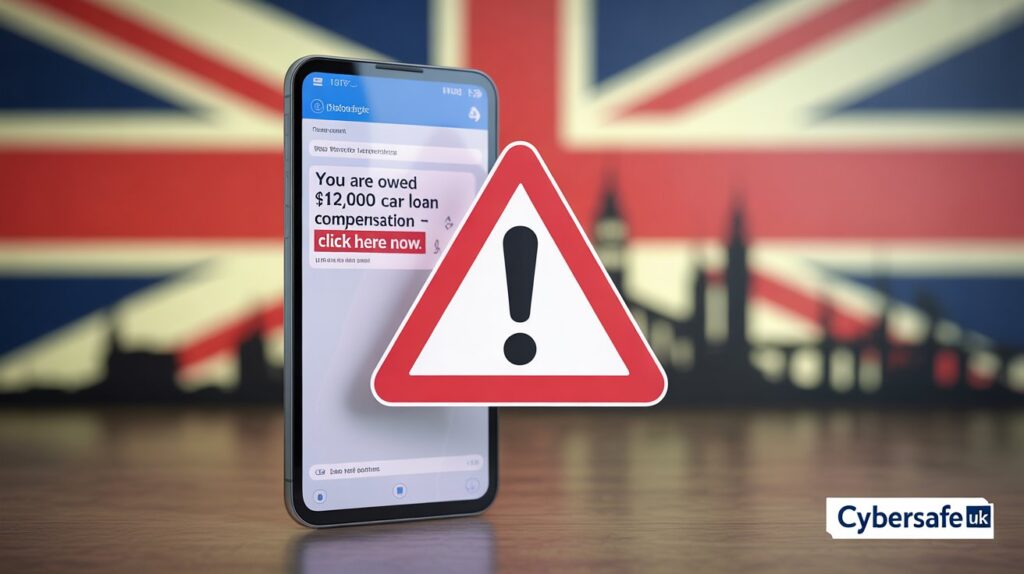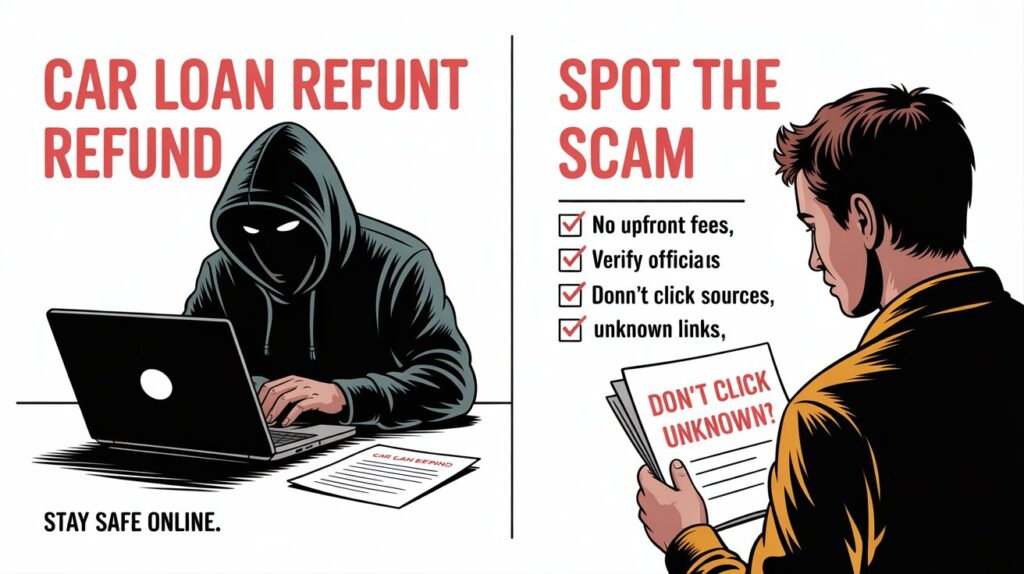In the UK, millions of people who took out car finance deals—especially Personal Contract Purchases (PCPs) and Hire Purchase (HP) loans—are now discovering that they may have been mis-sold. Regulators such as the Financial Conduct Authority (FCA) have launched investigations, raising hopes of compensation payouts for those affected.
But while the official process unfolds, fraudsters have spotted an opportunity. Enter the Fake Car Loan Compensation Scams—a fast-rising con in which criminals pose as claims management companies, legal firms, or even regulators. They contact unsuspecting victims with promises of thousands in refunds, only to steal personal information, bank details, or upfront “processing fees.”
In this article, we’ll break down exactly how these scams work, why they’re increasing in the UK, real-world examples, red flags to watch for, and most importantly—how you can protect yourself and your loved ones.
What Are Fake Car Loan Compensation Scams?
Fake car loan compensation scams exploit the real car finance mis-selling scandal that has dominated headlines. Many UK drivers took out loans where interest rates were unfairly inflated through hidden commissions, meaning they paid far more than they should have.
Scammers know people are expecting compensation, so they step in early with too-good-to-be-true offers.
Typical tactics include:
- Cold calls, texts, or emails claiming you’re “entitled” to thousands.
- Fake letters using FCA or Financial Ombudsman branding.
- Requests for upfront admin fees to “process your claim.”
- Directing you to bogus websites designed to harvest your details.
- Pushing for bank account information to “transfer your payout.”
The goal? To either steal money instantly or collect sensitive data for future fraud.
Why Are These Scams Rising in the UK Now?
- Regulatory Spotlight – The FCA’s investigation into car finance mis-selling has raised awareness. Fraudsters exploit the confusion by pretending they are part of the compensation scheme.
- Delayed Official Payouts – Genuine claims won’t be processed until late 2025 or beyond. Scammers know people are impatient and step in to “speed things up.”
- Financial Strain – With the cost-of-living crisis, many households are desperate for extra money. Fraudsters prey on that vulnerability.
- Easy to Impersonate – It’s simple for scammers to spoof caller IDs, design fake websites, or copy FCA logos, making their approach look legitimate.

How Fake Car Loan Compensation Scams Work
Here’s a step-by-step look at how these scams typically unfold:
1. The Approach
You receive a phone call, SMS, or email out of the blue. It might read:
“You are owed £9,750 in car finance compensation. Act now to claim before the deadline.”
2. Building Urgency
The scammer insists you must act quickly, or you’ll lose your right to claim. Pressure is key—they want you to skip careful thinking.
3. Request for Details
They’ll ask for your full name, date of birth, address, car finance details, or even National Insurance number—enough to commit identity theft.
4. The Payment Trap
Sometimes they’ll demand an “admin fee” (often between £100–£500) before processing your claim. Others may say your payout will be sent once you pay a release charge.
5. Disappearing Act
Once they have your money or data, the fraudsters vanish. Calls are blocked, websites shut down, and victims are left with losses and emotional distress.
Real-Life Examples
- Case 1: Sarah from Birmingham
Sarah received a text claiming she was entitled to £12,000 in car finance refunds. She clicked the link, entered her details, and paid £250 for “processing.” No payout ever came. Later, she discovered her bank account had been targeted for further fraud attempts. - Case 2: James from Manchester
James was cold-called by someone claiming to be from the “FCA Car Loan Refunds Team.” The caller used a spoofed number and even sent him a fake email. Thankfully, James grew suspicious when they demanded a £400 “release fee” and hung up.
These cases highlight just how convincing scammers can be.
Red Flags of a Fake Car Loan Compensation Scams
Look out for these warning signs:
- Unsolicited contact – No genuine regulator or bank will cold call or text you about compensation.
- Pressure tactics – Phrases like “act now” or “deadline today” are classic scam triggers.
- Upfront fees – Real compensation claims never require payment in advance.
- Suspicious links or websites – Fake domains often mimic FCA or government sites.
- Requests for sensitive info – Genuine processes won’t ask for your bank login, PIN, or National Insurance number over the phone.
How to Protect Yourself
1. Verify the Source
- If contacted, hang up and call your bank, lender, or the FCA helpline directly using numbers from official websites.
2. Report Suspicious Messages
- Forward scam texts to 7726 (the UK’s official spam-reporting service).
- Report phishing emails to report@phishing.gov.uk.
3. Don’t Share Personal Data
- Keep personal and financial information private unless you initiated the contact with a verified organisation.
4. Be Patient
- Remember: genuine compensation will take time. The FCA has stated official claims won’t start until late 2025.
5. Educate Family Members
- Scammers often target older or vulnerable people. Share this knowledge widely.

What To Do If You’ve Been Scammed
- Contact Your Bank Immediately – Ask them to stop payments and monitor for unusual transactions.
- Report to Action Fraud – Call 0300 123 2040 or use actionfraud.police.uk.
- Check Credit Files – With Equifax, Experian, and TransUnion to ensure no fraudulent accounts are opened in your name.
- Seek Support – Scams can be emotionally draining. Charities like Victim Support can help.
The Wider Picture: Why These Scams Work
Fake car loan compensation scams reveal a deeper issue: trust and desperation.
- Trust, because scammers copy the language, design, and professionalism of real institutions.
- Desperation, because many people are struggling financially and want quick fixes.
By understanding these psychological levers, we can be better prepared to resist them.
Government and Regulator Response
The FCA and Financial Ombudsman Service (FOS) have both issued warnings. Key messages include:
- They will never cold call or email consumers about compensation.
- Claims will be processed automatically—you won’t need to pay.
- Official guidance will be published later in 2025.
Meanwhile, the National Cyber Security Centre (NCSC) is working with telecom providers to block scam calls and texts.
Key Takeaways
- Fake Car Loan Compensation Scams are rising rapidly in the UK.
- Scammers exploit the real FCA investigation into mis-sold car finance.
- Victims are tricked through cold calls, emails, and fake websites.
- Red flags include upfront fees, urgency tactics, and requests for personal data.
- The safest action is to wait for official FCA updates and ignore unsolicited contact.
Conclusion
The promise of a payout is tempting, especially when times are tough. But remember: if it sounds too good to be true, it probably is.
Fake car loan compensation scams are designed to trick even the most cautious consumer. By staying informed, verifying every message, and sharing knowledge with others, we can collectively reduce the power of scammers.
Patience is key—the genuine compensation process will happen through official channels, not through a text or a random phone call. Protect your details, protect your money, and most importantly, protect your peace of mind.




